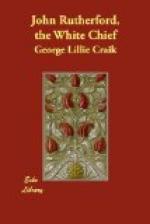“This was a sad disappointment to Pomaree, who found himself deceived in the hopes he had formed of increasing his wealth by the addition of another axe; and I cannot help believing that, for so tempting a reward, he would not have hesitated to take the life of the first person that came in his way, provided he could have done it with impunity. This chief omitted no opportunity of setting forth his great personal qualifications, as likewise the extensive authority he possessed; and he was constantly boasting of his warlike achievements, despising his rivals, and extolling himself over all the other heroes of New Zealand.”
Cruise has given us a short account of the manner of preserving heads; and we find it also detailed in Rutherford’s journal, somewhat more minutely. According to him the skull is first completely emptied of its contents, the eyes and tongue being likewise extracted; after which the nostrils and entire inside of the skull are stuffed with flax. At the neck, where the head has been cut from the body, they draw the skin together like the mouth of a purse, leaving, however, an open space large enough to admit the hand.
They then wrap it up in a quantity of green leaves, and in this state expose it to the fire till it is well steamed; after which the leaves are taken off, and it is next hung up to dry in the smoke, which causes the flesh to become tough and hard. Both the hair and teeth are preserved, and the tattooing on the face remains as plain as when the person was alive. The head, when thus cured, will keep for ever, if it be preserved dry.
Cruise says that the heads are only exposed to a current of dry air; but it appears, from Rutherford’s account, that they are hung in the smoke of a wood fire, and are thus, in fact, preserved from decaying principally by being impregnated with the pyroligneous acid. That the New Zealanders are well acquainted with the antiseptic powers of this extract is proved also by what was formerly stated as to their method of curing mussels. A French writer considers that this art of preserving heads is a proof of some original connection between the New Zealanders and the ancient world; as the process is as effective as that by which the Egyptians prepared their mummies.
In savage countries the spirit of war is very much a spirit of personal hostility; and both because of this, and from the state of society not admitting of the erection of expensive public memorials which elsewhere, or in another age, are employed to preserve the renown of military exploits, the barbarian victor generally celebrates his triumph on the body of his slain enemy, in disfiguring which he first exercises his ingenuity, and afterwards in converting it into a permanent trophy of his prowess.




